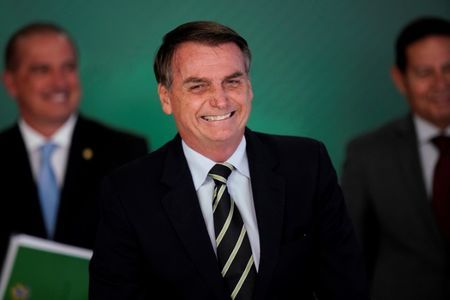Brazil’s President Jair Bolsonaro signed a decree loosening the country’s restrictive gun regulations, and hinted at further measures to arm law-abiding citizens to combat rampant crime.
The decree, which does not require congressional approval, scraps the requirement that Brazilians need to prove their “effective need” to own a firearm. Nevertheless numerous other restrictions remain, including the requirement that gun owners pass tests proving both their psychological aptitude and their capacity to handle a weapon.
“This measure is for upstanding citizens to have peace at home,” said Bolsonaro, a former Army captain, at an event in Brasilia on Tuesday. He added that the decree ensures Brazilians’ “right of defense” and that further changes to the law depend on congressional approval.
Brazil is one of the most violent countries in the world, with a murder rate of over 30 homicides per 100,000, compared with around 5 per 100,000 in the U.S. Much of Bolsonaro’s electoral appeal came from his tough line on law and order, including a promise to free up police officers to kill suspected criminals and allow Brazilians to arm themselves. A poll taken last month, however, showed that a majority of Brazilians oppose loosening the country’s gun laws.
While it is legal to own a gun in Brazil, bureaucratic obstacles limit their registration and most weapons are obtained illegally. In 2018, 48,330 licenses for guns and ammunition were issued and 210,097 were renewed, according to federal police data. By contrast, 94.9 percent of the 119,484 firearms seized by the authorities in 2017 had not been registered with the federal police, data from the Brazilian Forum on Public Security think-tank showed.
By itself, Bolsonaro’s decree is unlikely to help many more Brazilians purchase guns, not only due to the other stringent rules that will remain in effect, but also due to the high cost. Brazilian gunmaker Forjas Taurus SA dominates the local market and, without greater competition, some experts say legal fire arms will continue to remain prohibitively expensive for most.
But Onyx Lorenzoni, Bolsonaro’s cabinet chief, said that the government is studying opening up the market for guns. “There have to be new factories, so that they bring jobs and investment to Brazil,” he said. While Tuesday’s decree addresses gun ownership, a bill before Congress would also ease restrictions on the right to carry weapons, he added.
Promise Delivered
For the president, the decree is an opportunity to say he’s delivering on a high-profile campaign promise. A former paratrooper, Bolsonaro is a longtime gun enthusiast, famous for his signature gesture of imitating pistols with his hands.
In his manifesto for government, the president set out his stance clearly. “Guns are tools, inert objects, that can be used to kill or to save lives. This depends on who uses them: good or bad people.”
With relatively little to show for in his first two weeks in power, Tuesday’s executive decree will delight many of his supporters. But the policy is far from universally popular. A recent Datafolha survey found that 61 percent of Brazilians are opposed to liberalizing the country’s gun laws.
“This is the worst decision that could be made in a country as violent as Brazil,” Rafael Alcadipani, associate professor at the Getulio Vargas Foundation, said. “Research shows that the increased prevalence of firearms in a population always increases the rate of homicides and general crimes.”





























